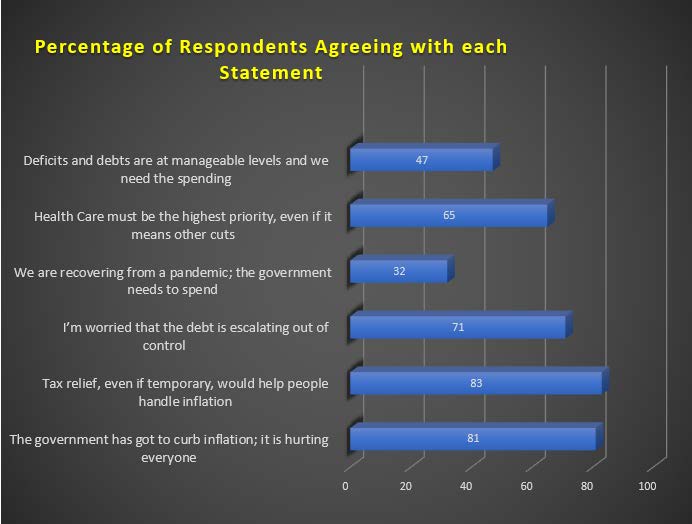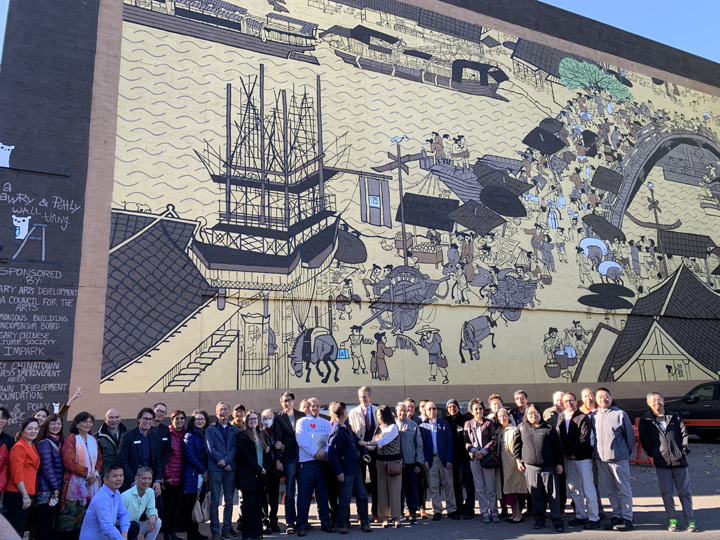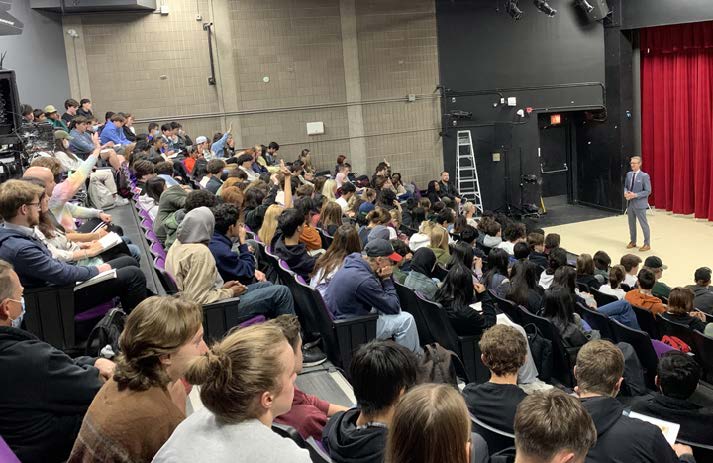E-Newsletter
October 20, 2022

When a party gets a new Leader, it is customary for him or her to change the assignments of the team; and so Pierre Poilievre has shuffled team assignments.
I will be moving from Natural Resources critic to the Environment Committee. As the Natural Resources critic, I focused a great deal on the convergence of responsible energy policy with sustainable environmental policy. This new assignment switches the angle of my focus, but not the core issues I’ve been working on. For those who follow my social media, you will have seen the moments when my colleagues have invited me to the Environment Committee to question witnesses.
Responsible Environmental Strategies: As a member of the Environment Committee, it will be critical to bring that balance to the discussions. I believe that Canada can pursue a responsible environmental strategy while still allowing people to affordably heat their homes and enabling businesses to keep the economy moving. I strongly believe that Canada could be contributing much more to global emissions control if we would just recognize the value of our responsible products and world-leading technologies, and help other countries switch to these advantageous options.
I am strongly opposed to those whose ideological blinkers restrict them to less effective strategies simply because they have decided that all fossil fuels are bad. You will already know that I put this government’s version of a carbon tax into that basket of less effective strategies, and favour greater reliance on LNG replacing coal and biomass; on nuclear electricity to supplement unreliable wind and solar; and on Carbon Capture, Utilization and Storage as an effective means to mitigate emissions from oil and gas. I will continue to advocate for those better solutions.
Clean Technologies: The Environment Committee’s current work is “a study of clean technologies being researched, manufactured, and utilized in Canada to reduce greenhouse gas emissions and reduce harms to the environment; [and] how Canadian clean technologies can be used to reduce global emissions”.
This work is right up my policy alley, and I’m excited to get started.
As always, please let me know if you have any thoughts or questions.

RESULTS FROM MY BUDGET SURVEY
In my last householder to all constituents, I asked respondents to check off the statements that they more or less agreed with when it came to spending and debt. Here are the results:

GOVERNMENT STILL LAGS ON CCUS – CANADA FALLS BEHIND
After much pressure, the government decided to join Canada’s majorcompetitors and move forward on incentives to decarbonize Canada’s economyby including Carbon Capture, Utilization and Storage (CCUS) in its budget lastspring. But here we are, six months later: where are we on CCUS in thiscountry? We are in the same place, really. Nowhere.
And we are still debating whether Enhanced Oil Recovery (EOR) – which injectswaste CO2 into older wells to extract oil with a considerably lower emissionsprofile than freshly drilled oil – ought to be included.
Of course it should. Canadian companies are going south of the border towork, where EOR is included, because Canada is so far behind. They aretaking jobs and tax revenue with them, and decarbonizing the US economy. I am relentless on this file. I call on the government to stop sitting onits hands, and move forward now with an effective and competitive CCUSincentive mechanism. I spoke in the House on October 6.
PAYING MORE WITH SMALLER PAYCHEQUES
On January 1st, your paycheque will get smaller because deductions for both CPP and EI will be going up. If you are a small business, you will be contributing more for each employee (businesses match CPP deductions; and pay 1.4 times the employee deduction for EI).
This comes on top of another $15/tonne increase to the carbon tax on April 1st (from $50 to $65), en route to tripling the tax to $170 by 2030.
With inflation running at 7%, these extra payments to the government come at the worst possible time. And despite government claims to the contrary, the Parliamentary Budget Officer has determined that 60% of Albertans will receive a carbon tax rebate that is considerably less than what they’ve paid.
On September 27 in Question Period, I asked the Minister if she would cancel these additional burdens on Canadian workers.
PEEKING INTO GOVERNMENT USE OFSPYWARE, DATA TRACKING
The Ethics Committee, until recently chaired by Calgary Rocky Ridge MPPat Kelly, has been doing important work if you worry about governmentpeeking through your curtains.
Spyware: “Sophisticated spyware can be deployed against a target as easily as by sending a text or calling a cellular number. Once the text or call is received, the user can turn on the target’s camera or microphone, access contacts, calls, cloud storage, and emails. In short, the target’s entire life can potentially be laid bare. Movements, conversations, unlimited images, banking information, health information, and any of the most intimate moments, from the bedroom, to the bathroom, to any other interaction, virtual or physical, with any other person, can be captured. It’s been called “wiretap on steroids”. (Pat Kelly, Chair).
The government and RCMP have refused the committee’s requests for information on the RCMP’s use of this spyware. They refuse to say if other agencies are using similar software, and even whether or not Members of Parliament have been targeted, while implying they might be. The Committee intends to continue pressing to open this curtain.
Facial Recognition: On October 4, the committee tabled its unanimous report on Facial Recognition Software and Artificial Intelligence in Law Enforcement, making 19 recommendations to protect Canadians’ privacy, including a prohibition on mass surveillance. You can read the report here.
Collection and Use of Cellphone Data: Earlier this year, the Committee presented a report on the Collection and Use of Mobility Data by the Government of Canada. You may recall during the pandemic, the government collected data showing the location of people with mobile phones (data de-identified). This raised concerns about privacy, transparency and consent. The committee made 22 recommendations to protect Canadians’ privacy, including the right of citizens to be meaningfully informed and have a realistic opt-out option. Read the report here.
Access to Information: They have now started to examine the egregious delays in responding to Access to Information (ATIP) requests. The government promised “open government” back in 2015 – they are delivering the opposite. Requests come very late (the standard is 30 days – some take years), are often mainly blacked out, and sometimes denied altogether. Access to information is a cornerstone of democratic government. It is how citizens and journalists find out what is happening behind closed doors.
Bill C-18 – ANOTHER ATTEMPT TO CONTROL THE INTERNET
In my last newsletter, I wrote about Bill C-11, which is now being studied by the Senate. Bill C-11 is the government’s attempt to let the CRTC monitor, control and even tax the posts Canadians make on the internet. It also controversially gives the CRTC the power to instruct platforms like Google and Meta to adjust their algorithms to prioritize government-approved content in your feeds and searches. To see my detailed analysis of C-11, please go to my September 29 newsletter here.
A companion bill, the Online News Act, is currently in Committee, but the government is working hard to let it fly under the radar. So far only two hours has been allocated for debate, and the sponsoring Minister (Heritage Minister Pablo Rodriguez) has not even spoken.
Bill C-18 is advertised as the means to compel large platforms (which the bill calls Digital News Intermediaries, DNIs) to pay news publishers when people repost or click their material online. This is meant to help financially support locally produced news. The bill requires DNIs to negotiate payments with news publishers, and gives the CRTC the right to intervene if suitable agreements are not reached.
Big Dollars to Support News Outlets: The Parliamentary Budget Officer estimated that Google and Facebook could underwrite 30% of the cost of creating news in Canada, by paying about $329.2 Million/year. This revenue is on top of the $595 million fund (over 5 years) that the government already doles out to qualifying news producers. Consumers can also claim a 15% tax credit for qualifying online subscriptions; and news agencies may set up charitable organizations to accept donations (with tax credits) to support journalistic initiatives. In other words, there is a lot of government sponsored funding for news in Canada.
The risks of government funding: Critics are concerned that with greater reliance on government-mandated funding, journalistic independence may be compromised when investigating or publishing critical commentary about the government. The identification of which news outlets “qualify” is also fraught with judgement and interpretation. In the digital age of blogs, podcasts and usergenerated online content, defining a “journalist” matters, and this bill hands it off to the CRTC, a government agency.
Representatives of the DNIs argue that the news publishers actually benefit when readers click on their material and go to their sites, increasing their audience numbers for advertisers. Therefore, they shouldn’t also receive a financial payment.
Some question why CBC is eligible when it already receives a billion dollars in taxpayer subsidies.
Broad and Vague: There are other issues, notably some very broad language that could embrace “content” that most people don’t think is “news” (such as a blogger’s opinion – should DNIs be obliged to pay bloggers? Should we all become bloggers and get paid?). The Bill also doesn’t require the reader actually click through to the story – a search index of possible links constitutes “making news available” under the definitions in the Bill and triggers a payment.
Unintended Consequences: One risk with Bill C-18 is that DNIs will respond by limiting the options that show up in searches, in order to limit their payment obligations. That restricts the free-flow of information to Canadians.
Bad Response to a Real Issue: Canadians do have concerns about the state of news information, and about the ability of local news outlets to continue to produce good quality, ethical and investigative reporting. Recent polling suggests that Canadians want:
- Local news to be supported, but not with the consequence of search engines manipulating or restricting their algorithms
- Publishers that qualify as “news outlets” to be required to respect journalistic standards and ethics
- Misinformation to not be treated as “news” by amplifying it
72% of Canadians report using Google Search at least once a day; and 44% say they use it multiple times a day. Yet only 21% believe that social media platforms should be required to pay news organizations a fee when a consumer shares an article on their own social media. Only 30% believe Google should pay a fee if someone clicks on an article that showed up in a search result. And 79% of Canadians would not pay a fee themselves to access a news article that
appeared in a Google search.
[Survey results are from Abacus Data, from 2,207 Canadians surveyed from August 19 to 26. See the full survey here.]
In short, this Bill does recognize an important issue – maintaining quality, independent journalism in a digital age – but with ill defined legislation, and a government rigidly opposed to hearing any better ideas.
The independence of journalism in our democracy should concern us all. This legislation doesn’t pass the test.
AROUND CALGARY CENTRE

There is an amazing new mural on 2nd Street in Chinatown (you can also see it from the Centre Street Bridge). Created by two Calgary artists, Rawry and Pohly, it incorporates Calgary references into an ancient Chinese scroll. I was honoured to be part of the unveiling.

One of the best parts of being an MP is taking questions from students.
This engaged assembly is from Western Canada High School.

Celebrating Navratri, a nine-day Hindu festival. Thank you to the Gurjathi Association of Calgary for hosting me!

To mark National Day for Truth and Reconciliation, I attended several events, starting with the Pokaiks walk to honour and stand in solidarity with survivors and victims of the residential school system.
Please get in touch if there’s anything my office can do for you.
Greg McLean, M.P.
Calgary Centre
403-244-1880
Greg.McLean@parl.gc.ca
GregMcLeanMP.ca